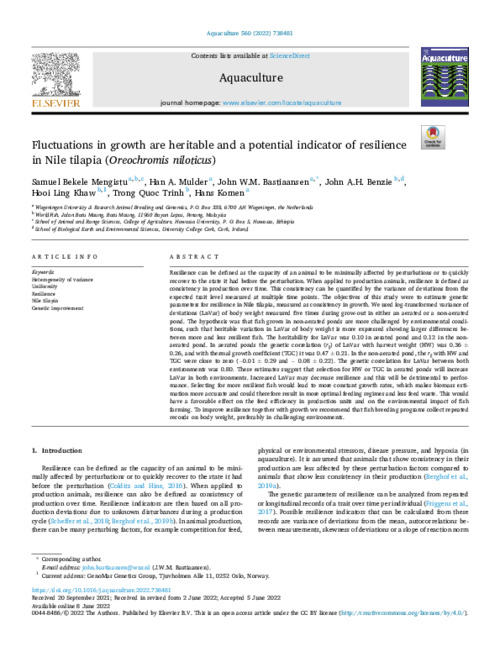Fluctuations in growth are heritable and a potential indicator of resilience in Nile tilapia (Oreochromis niloticus)

Resilience can be defined as the capacity of an animal to be minimally affected by perturbations or to quickly recover to the state it had before the perturbation. When applied to production animals, resilience is defined as consistency in production over time. This consistency can be quantified by the variance of deviations from the expected trait level measured at multiple time points. The objectives of this study were to estimate genetic parameters for resilience in Nile tilapia, measured as consistency in growth. We used log-transformed variance of deviations (LnVar) of body weight measured five times during grow-out in either an aerated or a non-aerated pond. The hypothesis was that fish grown in non-aerated ponds are more challenged by environmental conditions, such that heritable variation in LnVar of body weight is more expressed showing larger differences between more and less resilient fish. The heritability for LnVar was 0.10 in aerated pond and 0.12 in the non-aerated pond. In aerated ponds the genetic correlation (rg) of LnVar with harvest weight (HW) was 0.36 ± 0.26, and with thermal growth coefficient (TGC) it was 0.47 ± 0.21. In the non-aerated pond, the rg with HW and TGC were close to zero (−0.01 ± 0.29 and − 0.08 ± 0.22). The genetic correlation for LnVar between both environments was 0.80. These estimates suggest that selection for HW or TGC in aerated ponds will increase LnVar in both environments. Increased LnVar may decrease resilience and this will be detrimental to performance. Selecting for more resilient fish would lead to more constant growth rates, which makes biomass estimation more accurate and could therefore result in more optimal feeding regimes and less feed waste. This would have a favorable effect on the feed efficiency in production units and on the environmental impact of fish farming. To improve resilience together with growth we recommend that fish breeding programs collect repeated records on body weight, preferably in challenging environments.
Permalink
Date Available
Type
Publisher
Countries
ISSN
0044-8486,1873-5622
Copyright
CC-BY-4.0
Research Themes
Language